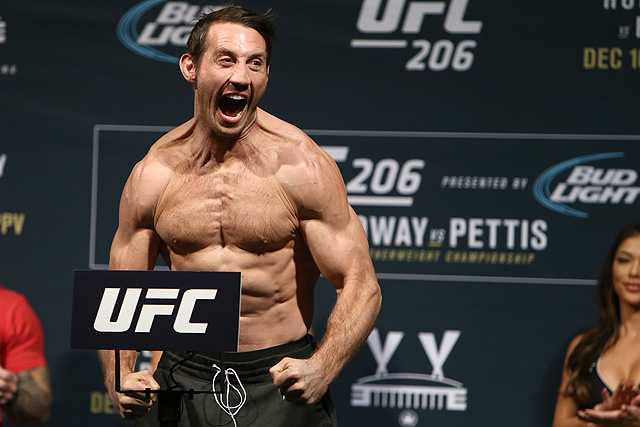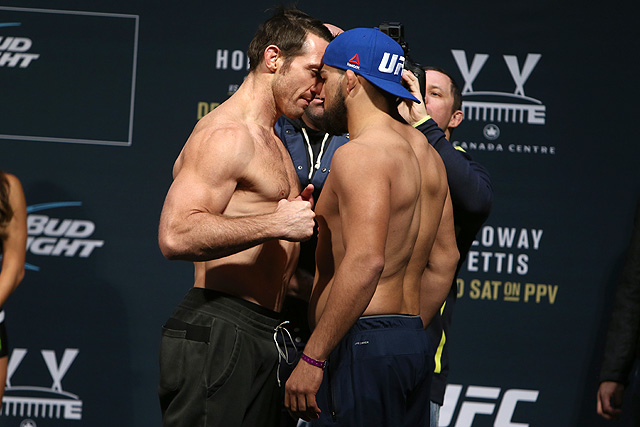Editor’s note: The views and opinions expressed below are those of the author and do not necessarily reflect the views of Sherdog.com, its affiliates and sponsors or its parent company, Evolve Media.
It’s Halloween, the day for celebrating all things spooky, as well as the only day of the year when using the word “spooky” is acceptable. As such, it’s worth thinking about what makes something scary in the first place. Whether real or imagined, the stories that scare us tend to have common denominators: an element of mystery, the vulnerability of being alone, the possibility of danger.
In the ultimate tough guy sport of MMA, it’s weird to think that anything is scary, other than the freakish physical damage that can happen in any given fight. However, the elements of spooky manifest in their own unique ways in this sport, so in honor of Halloween, I’ll be your guide through the haunted house of current MMA issues. You can close your eyes if you need to; I won’t judge.
The Unexpected
The most common trick of all scary movies is to shock the audience with a sudden, unexpected jolt. A monster will lunge from out the shadows; a body you thought was a corpse will reach out; or a door will abruptly slam shut. The most frighteningly unexpected part of MMA is when a United States Anti-Doping Agency rep comes rapping at your chamber door. Quoth Tim Kennedy (gun in hand), “Nevermore.”
The middleweight contender last week went on Donald Cerrone’s BMF Ranch Podcast to discuss his latest USADA test. According to Kennedy, a USADA agent arrived shortly after he had finished a training session. He had to wait an hour before he could get tested in order to allow his body chemistry to return to its baseline. Having just worked out, Kennedy wanted to shower, but USADA protocol is to keep the testee in sight at all times. You can see where this is going.
Having a man watch a professional athlete shower may not sound like a big deal. After all, Kennedy is a former Green Beret, and almost all high-level athletes have been around other dudes in various stages of undress. What makes this scary is how it sheds light on the boundaries -- or lack thereof -- of USADA. I’d bet that most fans and fighters alike support the idea of cleaner, safer athletes, but this episode raises an important question: At what point does it become an invasion of privacy?
The Ultimate Fighting Championship requires its independent contractors to inform the organization of their whereabouts at all times, just in case USADA decides to pay a visit. This can lead to all sorts of privacy compromises. A drug tester could potentially find out all sorts of personal information, from where a fighter’s parents live to where their children go to school. At a time when the UFC is growing in popularity and fighters are becoming more visible celebrities -- keep in mind, TMZ covers the sport to some extent -- this sort of thing carries heavy implications.
In the ESPN show “Playmakers,” the head coach of a fictional football team told his players that “the only guy who should terrify you more than me is the piss man.” Spoiler alert: The star running back, who had smoked crack a few days prior to getting tested, delivered clean urine in front of the drug testers. This isn’t just television drama; as intrusive as USADA is allowed to be, there are always ways to beat the system. This isn’t to say that they should get rid of drug testing altogether, but in the same way that police shouldn’t be able to spend the night in the living rooms of suspected criminals, it seems reasonable to suggest that USADA should have more defined boundaries.
The Unknown
The secret to building suspense and having it pay off is to maintain an air of mystery. Monsters are much less scary when you see their faces and understand their limits. The great unknown in the world of MMA right now is what the new UFC owners will do next.
MMAJunkie.com’s Steven Marrocco and Ben Fowlkes obtained and analyzed investor documents from the WME-IMG buyout. Some of it clarified what most of us already suspected: Conor McGregor and Ronda Rousey deserve most of the credit for the record-setting revenue of 2015. More importantly, this showed just how essential pay-per-view sales still are to the UFC’s bottom line, accounting for nearly 40 percent of all revenue for the promotion.
More documents outlined the general strategies of the new owners moving forward. Incentivized by bonuses for unprecedented earnings over the next two years that could amount to an extra $250 million, WME-IMG is primarily looking to improve its earnings through cost-cutting measures. The recent layoffs are only the initial phase of this. Further layoffs in the ballpark of 50 percent of its total payroll are expected, as well as a significant reduction of “The Ultimate Fighter” reality series. This is perfectly reasonable: If you’ve ever taken a Business 101 class or had to balance a personal budget, you know that the quickest way to having more money is spending less.
What’s unknown here is exactly how these cost-cutting measures will affect fighters. This applies to retired fighters like Chuck Liddell, Matt Hughes and Antonio Rodrigo Nogueira, who hold nebulously defined positions with the company that have been vaguely promotional but function mostly as a way for the previous owners to offer a retirement plan to reward their most prized contractors.
This also applies to fighters currently on the roster. It’s fair to say that the stars will be well taken care of, given how vital they are to the UFC’s profitability -- especially since Rousey is managed by WME-IMG in what looks very much like a conflict of interest. The greater unknown is how these measures will affect the lower-tiered fighters who aren’t quite as essential to driving pay-per-view numbers but are absolutely necessary to filling out fight cards. The best-case scenario for them, oddly enough, is to get cut. This frees them up to pursue more sponsorships and fight opportunities that would likely be more lucrative. If they are retained, they are stuck in a binding contract that greatly limits how they can make a living. If WME-IMG is indeed looking to reduce the number of events moving forward, this also reduces the opportunities these fighters have to earn a paycheck. For the family men and women scrapping on the undercards for five-figure payouts and chump-change Reebok checks, this has frightening implications, as well. Only time will tell.
The Uncontrollable
The final scary element we’ll get into is that which cannot be stopped. Think of the biologically or technologically superior alien races that toy with their human adversaries or villains like Freddy Krueger who are so adept at exploiting our weaknesses that they seem impossible to combat. This, of course, translates to MMA via the Reebok deal.
Former UFC heavyweight champion Fabricio Werdum felt a little froggy on Instagram last week and told Reebok to, ahem, “suck my balls.” Werdum quickly felt the consequences of his words and was relieved of his Spanish commentary duties.
I’m not suggesting we ought to feel sorry for Werdum, who should know better than to implore the mouth that feeds him, baby-bird style, to go lower. Werdum’s point about how cheap the Reebok payouts are, however, remains valid. Fighters continue to be shackled by awful contracts, creating an increasingly stratified landscape where only a small handful of contractors are benefitting from the Reebok deal. There is no news on this front, just more of the same, yet it seems like there is little that can be done against such a pervasive force.
In scary movies, the only answer for the seemingly unstoppable has been for people to band together. Though more fighters seem to warm to the idea of unionizing every day, there has been little in the way of discernible progress on that front, and until there is, telling Reebok to suck something or put it somewhere seems like the only course of action they have.
* * *
Getting in a cage is scary business, no matter how skilled or tough you are. In this day and age, however, it seems that the really spooky things exist outside the Octagon.
Hailing from Kailua, Hawai’i, Eric Stinton has been contributing to Sherdog since 2014. He received his BFA in Creative Writing from Chapman University and graduate degree in Special Education from University of Hawai’i. He is an occasional columnist for Honolulu Civil Beat, and his work has also appeared in The Classical. You can find his writing at ericstinton.com. He currently lives in Seoul with his fiancé and dachshund.



